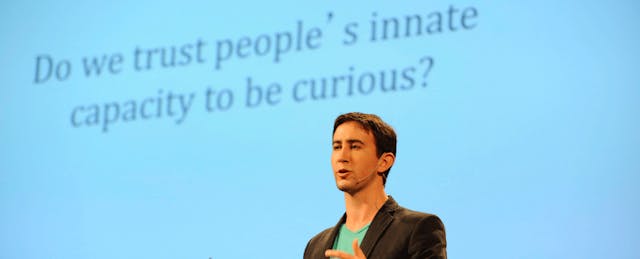Editor’s Note: ‘Tis the trendy season for trends, to reflect on 2014 and to make bold predictions about what next year may hold. This year, we asked thought leaders to share their outlooks on education, but with a twist. They have to frame their thoughts as a response to some of the finest college application essay prompts--yes, the very same ones that high school seniors are feverishly working on now!
Here’s what Dale Stephens, founder of UnCollege, had to say.
What is something that you’ve changed your mind about in the last three years?
I’ve changed my mind about many things over the years, but none as important as coming to believe that my startup idea was viable.
Three years ago, everyone told me I had made a terrible, stupid decision to drop out of school and dedicate my life to UnCollege. I had quit school to dedicate my life to unveiling the problems that plague higher education. I’d made some gains (being awarded the Thiel Fellowship and a book contract with Penguin) but everywhere I went people told me I was crazy. They said UnCollege--the self-directed learning resource I had developed for young adults looking to escape the woes of college debt--would never work.
I started to believe them.
So I set out to prove them wrong. I built UnCollege into a global movement and a community 30,000 people strong with offices in San Francisco and Sao Paulo. Soon, I was receiving invitations to talk about the little movement I started. At first, I didn’t know what to say. I wasn’t any more qualified to talk about the future of higher education than any other motivated 19-year-old concerned about his or her future. But people kept asking, and I kept making bolder statements. Eventually, I said I would “do” something and stop talking.
I started a Gap Year program.
We decided to explicitly teach people how to learn. Instead of teaching math and history, we would teach negotiation, communication, self-advocacy, and motivation. The hypothesis was that by teaching these skills, we could get young people ready to enter the real world in ¼ of the time and 1/10th of the cost. And if they decided to go to university, they would do so knowing how to make the most of their expensive degree.
It worked.
80% of the fellows who started the program received a job offer within a year of starting the program. The rest entered university knowing how to maximize their experience. Now we’re expanding our curriculum and coaching model to help more young people understand who they are, what they want to do and how to get there.
My startup is viable and more importantly, it’s helping people.
Three years later, I think I was right to make the leap and dedicate my life to this movement. Higher education has forever changed since 2011. We’ve seen the rise, fall, and slow resurgence of MOOCs, the once-heralded saviors of the rising cost of higher education, find their footing in a post-college world. In an effort to save themselves and prove that they, too, can be innovative, brand-name institutions jumped on board--only to watch General Assembly expand to 14 locations, not to mention the 90 other coding schools that have popped up around the world. This year, for the second year in a row, enrollment is United States colleges declined. The transformation of the system has only just begun.
I can’t wait for 2015.


